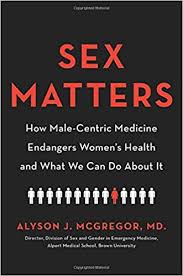I’ve spent the past 20 years writing about female sexual health. For the majority of that time, I suspected that I was suffering from some form of female sexual dysfunction, both because of “low” libido levels and because of painful intercourse. The male-dominated medical establishment wasn’t providing any answers. The desire to fix myself drove my entire career path.
Being so entrenched within the world of sexuality professionals, it’s easy to forget that “women’s health” means more than just “sexual health” or “reproductive health.” And popular media plays into that emphasis on our reproductive systems.
 But in Alyson J. McGregor, MD’s Sex Matters, which just came out in May, readers are reminded that their sexual health is just one small part of their overall health and wellbeing — and that genitals aren’t the only thing that sets apart those assigned female at birth from those assigned male.
But in Alyson J. McGregor, MD’s Sex Matters, which just came out in May, readers are reminded that their sexual health is just one small part of their overall health and wellbeing — and that genitals aren’t the only thing that sets apart those assigned female at birth from those assigned male.
McGregor’s book is about how our healthcare system caters specifically to men, leaving women with no choice but to be subjected to inadequate healthcare. In Sex Matters, readers learn that this gender imbalance is rooted in medical research that overwhelmingly relies upon male subjects and that focuses on male-dominated health issues. This, in turn, leads to medical school curricula based upon research that can’t help but be grounded in gender bias, and to healthcare practitioners who then carry this internalized bias with them into their jobs, whether unconsciously or not. These disparities persist despite the fact that ailments present differently in women vs. men, and despite the fact that our bodies react differently to different treatment regimens.
Sex Matters isn’t the first book to acknowledge gender imbalances within the field of medicine. Books like Maya Dusenbery’s Doing Harm and Sarah Ramey’s The Lady’s Handbook for her Mysterious Illness have already kickstarted conversations about the inadequacy of women’s healthcare. But McGregor’s book takes this conversation further, providing readers with concrete, actionable steps they can take to ensure that the healthcare they receive caters to who they are. In this way, women can reclaim control of their health in the face of doctors who don’t believe them or who prescribe treatment regimens that can’t possibly serve them.
I found myself highlighting sections that contain actual scripts on how to open up conversations with medical care providers, ensuring they don’t automatically lean on male-dominated frameworks. I also bookmarked McGregor’s meaty appendices: one with a template for creating a comprehensive medical history and another with further recommended reading. Knowing a problem exists is all well and good. But what McGregor provides is the means by which we can fix that problem, starting with our own healthcare.
I read an advance copy of this book, but you can be sure that I already have the final print copy of this book on order. This book is a tool women can use to take control of their healthcare. I predict that readers will find it to be an essential resource they’ll end up turning to again and again.
Click here to purchase Sex Matters by Alyson J. McGregor from our Bookshop.org site!



Pingback: My 31 Favorite Reads of 2020
Pingback: On Grappling with Chronic Illness When No One Believes You